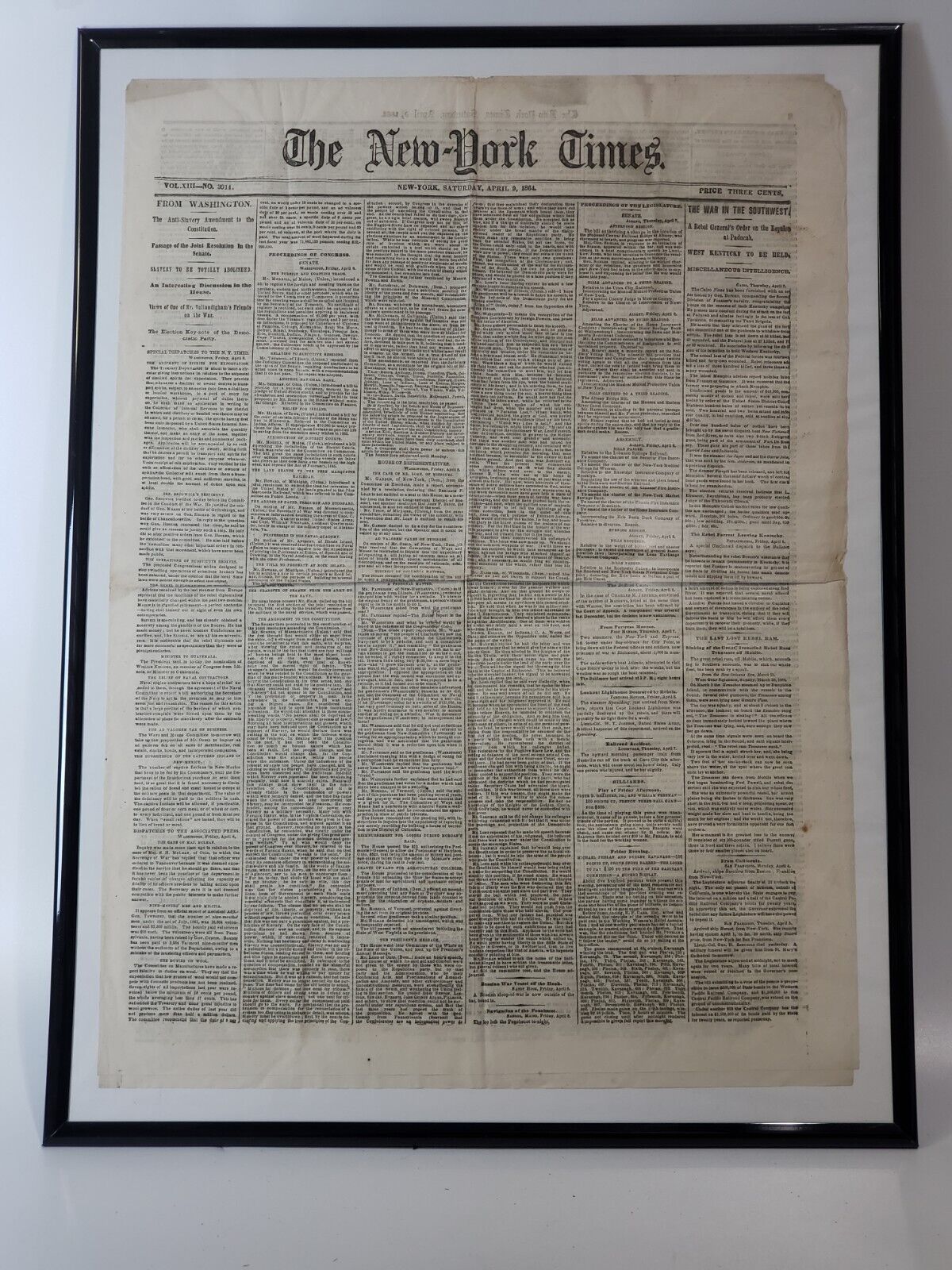When you click on links to various merchants on this site and make a purchase, this can result in this site earning a commission. Affiliate programs and affiliations include, but are not limited to, the eBay Partner Network.
This is the only one for sale. There are no records that this newspaper has gone for sale in sales in the past. This is the first step to abolishing slavery and one of the rarest newspapers of the new york timed.
This is an extremely rare New York Times newspaper from April 9, 1864. The headline announces the abolition of slavery through the 13th Amendment. The paper is a must-have for collectors of historical newspapers and those interested in Civil War-era memorabilia. It's a wonderful piece of history that can be added to any collection.
The 2012 film Lincoln told the story of President Abraham Lincoln and the final month of debate over the Thirteenth Amendment, leading to its passage by the House of Representatives on January 31, 1865. What the film did not portray, however, was the Senate’s part of that story.
While Lincoln waited until late 1864 to publicly support an abolition amendment (while quietly supporting it behind the scenes), Radical Republicans like Massachusetts senator Charles Sumner and Ohio representative James Ashley called for such action in 1863. Sumner and his allies applauded Lincoln's Emancipation Proclamation, but they believed the wartime measure did not go far enough. Instead, they demanded what they termed a “constitutional guarantee” of “perpetual freedom.” Such debates—barely hinted at in the movie—shaped the language of the amendment and influenced an evolving definition of equality.
In late 1863 Sumner became chairman of a new committee on slavery, where he hoped to consider all proposals for abolition. On February 8, 1864, he introduced his own constitutional amendment, asking that it be referred to his committee. Judiciary Committee chairman Lyman Trumbull objected, insisting instead that his committee must consider such proposals. The Senate sided with Trumbull. Sumner’s radical views stirred action, but they also made enemies. “If I could cut the throats of about half a dozen senators,” confessed William Pitt Fessenden of Maine, “Sumner would be the first victim.” Many supporters of an abolition amendment feared that any association with Sumner could undermine success.
By January of 1864 the Senate Judiciary Committee was debating and drafting the amendment. Sumner’s proposal for absolute “equality before the law” was rejected. Making all persons “equal before the law,” argued one senator, might lead to dangerous consequences, such as providing voting rights to women. Instead, the committee approved more modest language that echoed the Northwest Ordinance of 1787. “Neither slavery nor involuntary servitude, except as a punishment for crime whereof the party shall have been duly convicted, shall exist within the United States.”
On February 10, 1864, Trumbull reported the amendment out of committee and full Senate debate began. Fears of race-mixing and social upheaval—issues that figured prominently in the later House debate—were largely absent. Rather, senators argued over the constitutionality of uncompensated emancipation, the nature of federalism, and the propriety of adopting the first constitutional amendment in 60 years. A few radicals sought ways to empower the freedmen with civil and economic rights, but most senators agreed that abolition alone was the goal. “We give the [black man] no right except his freedom,” explained Missouri senator John Henderson. “[We] leave the rest to the states.”
On April 8, 1864, the Senate took the first crucial step toward the constitutional abolition of slavery. Before a packed gallery, a strong coalition of 30 Republicans, four border-state Democrats, and four Union Democrats joined forces to pass the amendment 38 to 6. In the months that followed, two test votes failed in the House and the amendment was sidelined by the national election. Then, in December, representatives convened a lame duck session to renew the debate. This set the stage for action in January of 1865 by the newly reelected Abraham Lincoln. That is where the movie begins.









